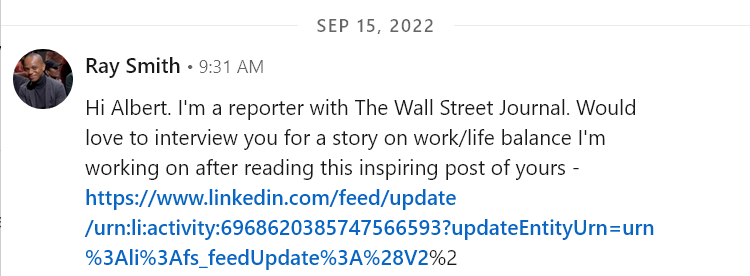Discussing Work/Life Balance With The Wall Street Journal
A few months ago, Ray Smith from The Wall Street Journal got in touch with me after seeing one of my sabbatical posts on Linkedin.

We chatted for about half an hour about work/life balance, and then Ray sent me some followup questions.
Unfortunately my section of the article never ran, but I kept some of my notes and am publishing them here so that people besides me and Ray can read them 😁
You can read the article that was eventually published here: Your Coworkers Are Less Ambitious; Bosses Adjust to the New Order.
Interview Followup Q&A
[Ray S.] You said shortly after you started working full-time about 10 years ago after you had graduated from college, you realized you weren’t sure that you would be able to work in a traditional 9 to 5 office job for 40 years. You mentioned it could be a grind at times.
Questions: What was your full-time job out of college?
[Albert W.] I worked as an analytics architect for Blue State Digital (now just Blue State), a consulting agency for nonprofits and cause-based marketing. I started working there part-time before I graduated, then full-time after I graduated.
What about it was a grind? Can you give an example or two of how it was a grind or what about it was a grind? Was it a relentless pace?
Like many agencies, there was a focus on billable hours over results or impact; the agency only gets paid for an hour of work when you do an hour of work and bill it to the client. Tracking every 15 minutes of your day sucks and leads to a constant anxiety about balancing billable work with professional development and admin tasks.
Pace was also a part of it - there was general pressure to get projects shipped, but additional pressure particular to my role as analyst on projects. Because we were so focused on shipping new projects, there was rarely time to review historical data, do analysis, or study data after launch, which is the fun and insightful part of that job.
What specifically did you not like about the traditional 9 to 5?
Some of it was the time itself; a full 40 hours of prime daylight taken away from you every week.
Some of it is the flexibility; all kinds of cool things happen during normal business hours, and it’s hard to take a couple hours
Some of it was the work; it often felt like my work didn’t have much of an impact because clients didn’t implement my advice. I had limited support when I was overscheduled, and limited opportunities to learn new things and develop professionally.
What were your goals or dreams when you got out of college and got that job?
I saw digital marketing as a great way to combine my interest in data with the play of creativity. I wanted to help important causes (see the BSD client roster) use the internet to raise awareness and money through the art and science of digital marketing.
Doesn’t sound so bad typing it out now :)
You had mentioned you wanted to climb the corporate ladder. Can you give specifics about what you wanted to climb to? And then what changed? I mean, was there something that happened that made you question if that goal was something you wanted after realizing it might require you enduring the 9-to5- structure or having no work/life balance?
I realized pretty quickly that work will take as much from you as it can. People stayed super late at the office and answered emails at all hours so climbing the ladder for me became about getting paid more for my time so I wouldn’t have to work as long. This generally meant looking for better-paying jobs with fewer expected total hours (including work, commute, prep) while ignoring things like title-only promotions.
I’ve also been learning about permaculture over the last few years. On the surface, permaculture is about regenerative agricultural systems, but food has a way of touching many aspects of the human experience including labor, leisure, and social networks. Because of this interconnectedness, permaculture offers a systems-based framework for understanding and addressing many social issues that we experience in modern society, from climate change to social justice. I started exploring permaculture as a way of designing a more thoughtful, connected life for myself, and took a two-week permaculture design course (PDC) last fall that accelerated my desire to leave traditional employment and start practicing permaculture in my own life.
In your last job, you talked about being burned out and how constant Zoom was a factor. I got a little confused. When did you all go remote? At some point did you all return to office or go hybrid? Were you still doing Zoom meetings by the time you left or were you all back in the office? I’m just trying to figure out if going back to the office helped alleviate any burnout you had been feeling.
Technically this was mostly Google Hangouts, but I’m not sure it matters. We went all remote in early 2020, then had a sort of false-start return-to-office in September that turned into a sort of hybrid model where you could come into the office if you wanted to. I went into the office about once a week - there were usually 2 or 3 other people there - and sometimes the entire marketing team (~7 people) would coordinate to come in on a particular day. My average day was still pretty video-call heavy during this time through when I left in February. I think it may have had a positive influence if I had gone in more often or seen more people in the office when I went in, but in practice probably had a negative impact as navigating the latest RTO plans became yet another thing to juggle.
Can you be a little more specific about how the combination of the Zoom fatigue, the shakeup/new team and you’re not being inspired by the work you were doing further made you accelerate your plans to take a break? I'm trying to summarize what all that told you about 9 to 5 corporate life, or if it confirmed any thoughts you had about corporate life.
Sure. If those things hadn’t happened, I would have continued working until I had enough money to fully retire early (cover my annual expenses of $20-30k with a 3-4% distribution from my investments), which probably would have taken another 5-10 years. As it actually happened, it felt silly to be sitting on significant savings while I toasted my brain to a crisp. It took a few additional months of working to get to a shorter-term savings goal that gave me enough cash on hand to cover a sabbatical.
There are a few good things about working a regular job, and hanging out with people you like and trust is one of them. When that gets replaced with pure work (Zoom) or little trust (new team), work has even less appeal.
And lastly, on the Zoom fatigue, it sounded like you felt chained to your computer while working remotely for eight hours straight. How did that differ from being in the office for eight hours? Was it the inability to break the time up and interact with others that was part of the issue?
Precisely; the office offered a wider variety of environments and interactions with others than being at home. At the office, it was a regular part of the day to do a bit of work at your desk, walk out for coffee, go to a meeting room, go out for lunch, work from a booth or common space in the afternoon, then drive home (leaving my computer in the office). Working from home felt much more one-note: work from your desk, walk 10 seconds to get coffee or go to the bathroom, talk to all your coworkers online.
I also had a very short commute (7 minutes driving plus a couple minutes walking, or ~15 minutes biking) that was a nice marker between work and home. I tried to create something similar with walks while working from home, but it wasn’t quite the same leaving and coming back to the same space.



